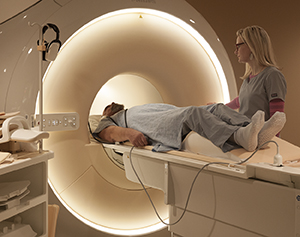Magnetic Resonance Angiography (MRA)
Magnetic resonance angiography (MRA) is an imaging test and a type of MRI. It uses MRI to create images of blood vessels throughout your body. It uses both strong magnets and radio waves to form an image that can be viewed on a computer. During MRA, you lie flat inside an MRI scanner. This is a large, tunnel-like tube. Contrast dye may be used. This is done to make your blood vessels easier to see. The test is done by a technologist.

Why MRA is done
MRA may be used to:
-
Check arteries in your neck, chest, belly, kidneys, pelvis, arms, legs, or brain
-
Find damage to your arteries caused by injuries
-
Look for a ballooning of the blood vessel wall (aneurysm), narrowing of the blood vessel (stenosis), or tear in the blood vessel (dissection)
Getting ready for your test
-
Follow any directions you are given for taking medicines or for not eating or drinking before your test.
-
Follow your normal daily routine unless your healthcare provider tells you otherwise.
-
Most MRI/MRA tests take 30 to 60 minutes. Depending on the type of MRI you are having, the test may take longer. Give yourself extra time to check in.
Tell your healthcare provider if you:
-
Are allergic to X-ray dye (contrast medium), iodine, shellfish, or any medicines
-
Are breastfeeding
-
Are pregnant or think you may be pregnant
-
Have any serious health problems, such as kidney disease or a liver transplant. You may not be able to have the dye used for MRA.
-
Tend to be afraid of small, enclosed spaces (claustrophobic)
Special concerns
MRI uses strong magnets. Metal is affected by magnets and can distort the image. The magnet used in MRI can cause metal objects in your body to move. If you have a metal implant, you may not be able to have an MRI unless the implant is certified as MRI safe.
People with these implants should not have an MRI:
-
Certain clips used for brain aneurysms
-
Certain metal coils put in blood vessels
-
Certain ear (cochlear) implants
-
Some defibrillators
-
Some pacemakers
Tell your healthcare provider if you:
-
Have a bullet or other metal in your body
-
Have a pacemaker, surgical clips, metal plate or pins, an artificial joint, staples or screws, cochlear implants, or other implants
-
Have braces. You must remove any dental work.
-
Have had any past surgeries
-
Have implanted nerve stimulators or medicine-infusion ports
-
Have metal splinters in your body
-
Have tattoos or body piercings. Some tattoo inks contain metal.
-
Wear a medicated adhesive patch
-
Wear makeup, since it may contain some metal
-
Work with metal
What to tell the technician
Tell your healthcare provider and the technician if you:
-
Have ever had an imaging test, such as MRA, MRI, or CT with contrast dye
-
Are allergic to contrast dye, iodine, shellfish, or any medicines
-
Have a serious health problem, such as diabetes or kidney disease, or had a liver transplant
-
Are pregnant or may be pregnant, or are breastfeeding
During your test
-
You’ll be asked to remove your watch, jewelry, hearing aids, credit cards, pens, pocketknives, eyeglasses, and other metal objects.
-
You may change into a hospital gown. An IV (intravenous) line may be started in your hand or arm.
-
You will lie down on a platform that slides into the MRI machine.
-
At times, the magnet may be within a few inches of your face. It's normal for the MRI machine to make loud knocking noises during some parts of the exam.
-
Several studies may be done. Contrast dye may be injected into your vein through an IV line for some of the studies.
After your test
-
If you were injected with dye, drink plenty of fluids. This will help flush the dye from your body.
-
The radiologist will analyze the results and provide a report to your primary healthcare provider (the person who referred you for the test). Your healthcare provider will discuss the results with you when they are ready.
Online Medical Reviewer:
Neil Grossman MD
Online Medical Reviewer:
Rita Sather RN
Online Medical Reviewer:
Tara Novick BSN MSN
Date Last Reviewed:
9/1/2022
© 2000-2025 The StayWell Company, LLC. All rights reserved. This information is not intended as a substitute for professional medical care. Always follow your healthcare professional's instructions.